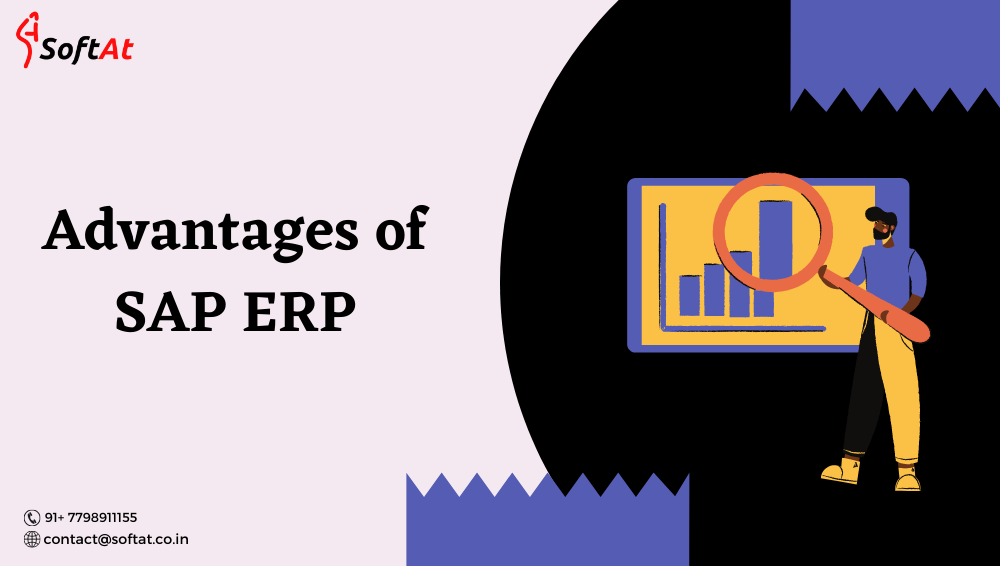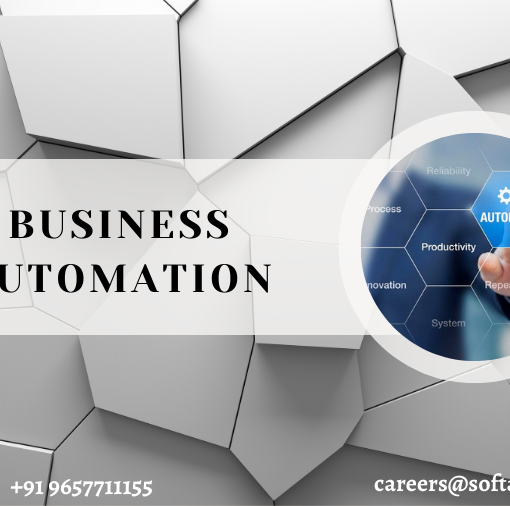
(Advantages of SAP ERP)Enterprise Resource Planning is a huge and growing industry right now. It serves as the brain of the organization’s technological system, which integrates all aspects of a company’s operations, such as product development, manufacturing, marketing, and sales. Companies can gain visibility, improve productivity and operational efficiency, reduce expenses, and raise competitiveness with the support of these areas. This expanding industry has a wide range of beneficiaries, including implementation professionals who are paid well, client businesses that gain from software integration, and end-users who benefit from easy user interfaces. PeopleSoft, Oracle, HP Microsoft, and SAP are just a few examples of prominent ERP software. SAP has emerged as the ERP software of choice for many industries, and it is projected that this trend will continue in the future years. SAP ERP software aids in the integration and simplification of company processes such as finance, human resources, and other activities.
There are other reasons as well which show that SAP is different than other ERP software systems. Let’s have a look at them:(Advantages of SAP ERP)
- SAP is Suitable for any Size of Business, i.e., from Small to Large Size Companies: Other ERP systems are used in different sizes of enterprises, but SAP ERP is employed in practically all dimensions of firms. SAP offers a complete solution that can be implemented quickly. Transitions are also simple due to the company’s growth and development. SAP also offers a number of cloud-based solutions and integrates with third-party services such as Google and PayPal. SAP is a software company that offers a variety of services. SAP allows for great development and flexibility, and as a result, small firms profit greatly from it. It also provides the functions and competencies that the world’s greatest corporations require. SAP is presently used by about 80% of Fortune 500 firms, including Pfizer, Phillip Morris, and Johnson & Johnson, among others.
- SAP does not Provide Any Redundant Functionality: SAP AG is a well-known German firm that was created in 1972 and specializes in building ERP software that delivers the same integration solution to businesses all over the world. Today, SAP ERP software is approved in more than 50 countries, and there is no question that SAP ERP software will continue to acquire acceptance in most countries.
- SAP does not Provide Any Redundant Functionality: Any company’s employees, on the other hand, require training and time to learn how to utilize a new ERP system. Employees can learn the ERP system fast and in less time if it is short and straightforward. Few ERP systems, such as Oracle, provide a wide range of capabilities for most firms, the majority of which are superfluous, making learning more difficult. SAP ERP, on the other hand, provides the function in accordance with the business requirements. SAP makes all of the functionalities simple so that the user may learn them quickly and avoid becoming confused.
- SAP is Perfect For any Business: SAP is compatible with practically all industries, whereas other ERP systems are not. Most businesses implementing a new ERP system aren’t sure what functionalities or modules they’ll need. SAP has a large assortment of custom-fit options without the need to pay for customization. Businesses can benefit from SAP’s integration since when one module is changed, the other modules are updated as well.
- SAP Provides Shorter Implementation Time and Fastest Financial Payback: After Oracle, SAP is the second most expensive ERP system. When compared to competing ERP systems, SAP provides the fastest financial reimbursement, which is a benefit for SAP users. Simultaneously, SAP takes less time to implement than its equivalent, allowing for faster success.
- As Compared to other ERP Systems SAP Needs Fewer Customization: When compared to other ERP systems, SAP provides a number of unique features. As a result, less customization is required, slowing down the installation process. However, it has been observed that SAP provides a wide range of customizable solutions that are suitable for practically all types of business needs. In comparison to other ERP systems, SAP now has quite expensive fees. Other vendors, such as Oracle, are constantly improving and modifying their software; as a result, SAP must work extremely hard to keep ahead of the competition.
- Constant Development in SAP: SAP releases new ERP system versions on a regular basis. SAP R/2 was initially superseded by SAP R/3, which was eventually replaced by SAP ERP. SAP ERP solutions are likewise evolving. SAP Basis was replaced by SAP Web Application Server, and eventually, SAP Web Application was replaced by Net Weaver. SAP releases upgrades on a regular basis in order to stay current with industry changes.
- Industry Best Practices: SAP ERP is implemented in accordance with industry best practices and case studies, ensuring that enterprises remain competitive in the industry. The use of industry best practices as a reference confirms that there is a reduction in cost, risk, and time. The increase in resource utilization results in cost reduction. Any new software solution must be implemented with a certain amount of risk. When SAP ERP is used in accordance with industry best practices, it helps to reduce risk by eliminating ambiguity in the end product.
- Presence of Clearly Defined Roadmaps: The SAP ERP deployment includes roadmaps that are detailed and well-defined. These roadmaps serve as a point of reference during SAP ERP deployment. The project preparation phase, the business planning phase, the understanding phase, the finishing preparation phase, and the go-live and support phase are all included in the roadmap. Each of these phases is further broken down into more detailed step-by-step instructions. In addition to these roadmaps, SAP ERP installation provides an implementation assistant who assists in the execution of the implementation strategy. The implementation assistant is built with a variety of tools and templates to ensure that SAP ERP setup is as straightforward as feasible.
- Industry Specific: Various industries, on the other hand, have their own SAP ERP solution. The solution is created in such a way that it meets the requirements of a company. For example, an ERP material management module is appropriate for the automotive industry but not for the accounting business. The many modules have been tweaked to capture all of the major business processes in various industries.
- Scalability of Software Solutions: To be successful, software solutions must have a scalability feature. In data processing, SAP stands for Systems, Applications, and Products. SAP ERP solutions are generally built to grow with the company, which implies that when the company grows in size, so does its capacity. This is an important feature that prevents the software solution from becoming static due to organizational practices both internal and external modifications.
- Low-risk Method: SAP ERP is implemented using a low-risk process that ensures that the requirements for altering figures are met. This is particularly effective in industries with a lot of structure, such as financial services and pharmaceuticals. The financial services industry has unique requirements for threshold flexibility, minimum capital, gearing levels, and financial reporting. Depending on the company’s location, the SAP ERP deployment approach ensures compliance with international financial reporting requirements and the United States Sarbanes Oxley Act. This strategy lowers the possibility of experiencing legal penalties and a negative audit outlook as a result of irregularities. The low-risk strategy is critical in SAP ERP since it makes SAP valuable to the market’s large enterprises.
- Developments in SAP across Industry limitations: The SAP ERP system advancements are recognized across industry limitations, which implies that the supplied improvement may not be relevant to more than one industry. An upgrade to the Human Capital Management module, for example, would be unique. Assume the upgrade offers a new e-recruiting capability known as automated ineligibility. This improvement would be applicable to all industries because recruitment is an important function in all organizations because only people can run a business.
- Ecosystem Benefit: SAP ERP touts the benefits of its ecosystem. The ecosystem benefits are tied to the customer; in this example, the client firms who want to deploy SAP ERP are the customers. Clients, partners, and individuals can use this advantage to collaborate on a standard solution for a specific problem and debate other SAP ERP topics. This is an additional benefit that goes above and beyond what ordinary ERP system vendors offer in terms of client service. SAP ERP specialists can recognize both ongoing and new company requirements thanks to this benefit.
conclusion of Advantages of SAP ERP
In conclusion, SAP ERP offers a range of advantages that enable organizations to streamline operations, enhance efficiency, improve decision-making, and achieve overall business success. With integrated processes, enhanced visibility, automation, and scalability, SAP ERP empowers businesses to optimize resource utilization, increase productivity, and effectively manage their supply chain and financial operations. Moreover, the centralized data management and compliance features of SAP ERP contribute to improved data accuracy, risk mitigation, and regulatory compliance. Overall, SAP ERP serves as a powerful tool for businesses to drive growth, improve customer satisfaction, and maintain a competitive edge in today’s dynamic market. (Advantages of SAP ERP)





